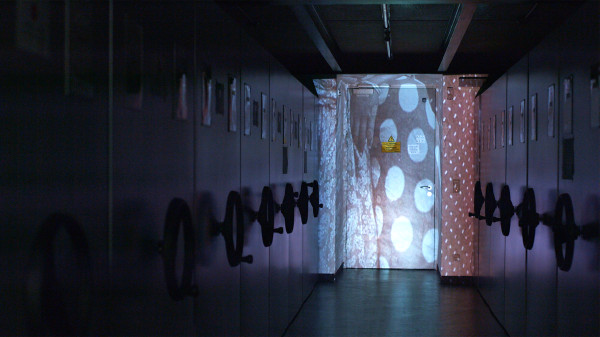Les Complices* and Histnoire.ch invite you to an evening of films from and with Belinda Kazeem-Kamiński at fraum*
Belinda Kazeem-Kamiński is a writer, artist, and scholar. Rooted in Black feminist theory, she has developed a research-based and process-oriented investigative practice that often deals with archives, specifically with the voids in public archives and collections. Her work engages with the colonial violence documented and carried forward in these archives, seeking for ways to make the violence visible without reproducing it. Interlacing the documentary with the fictional, her works manifest themselves through a variety of media and dissect the present of an everlasting colonial past: a past without closure.
Together we will watch the films Unearthing. In Conversation, The Letter and Fleshbacks.
Please note: The event will take place at fraum* at Mattengasse 27, in Zurich. The venue is not barrier-free for wheelchair users. This film evening is a gift from Belinda. Invited are BIPoC FLINTAQ. There will be hot soup and drinks, as well as a pot for donations.
We ask for registration via: info@lescomplices.ch
All films are in english. German subtitles will be printed out.
We are looking forward to seeing you!
Belinda Gökçe, Jovita, Reem
More Infos about the films:
In the video projection Unearthing. In Conversation (2017, Video, color + sound, 16:9, 13 min), interrogates several layers of the colonial legacy – in its making of dominant history and its constitution of the voyeuristic gaze. Starting point are portraits featuring Austrian Czech ethnographer, missioary and author Paul Schebesta posing with people from the former Belgian Congo (the Democratic Republic of the Congo today). Belinda Kazeem-Kamiński speaks to the people they depict, trying to find ways to communicate beyond the racist filter of the colonial archive. She also addresses the absent and accomplice audience. This work
is about finding artistic and discursive methods to transform and reconfigure strategies of representation and structures of looking in order to rid them of their inherent violence.
The Letter (2019 Video, color and sound, 16:9, 18 min) retells the Domeïs story of Yaarborley Domeï in a speculative and futuristic way. Yaarborley Domeï was from West Africa, who performed in the context of a so-called Völkerschau and wrote an open letter in 1896, which was published in the newspaper Wiener Caricaturen. More than a hundred years after the publication of the letter, three protagonists, called "empaths" by the artist, follow the traces of Yaarboley Domeï's life. They break into an archive to fathom her story, which is told in fragments and seems to haunt them, and ends up haunting the archive as well…
Fleshbacks (2021 Video, color and sound, 16:9, 6 min) is a three-part annotation to The Letter (2019). The film’s protagonists are not the same performers as in The Letter, but they show a certain connection to them. It seems as if they are all following something, what some might call a calling, leading them into a zone where the lines between Vienna and Accra, between the then and the now, as well as the here and there, become blurry and ultimately obsolete.
